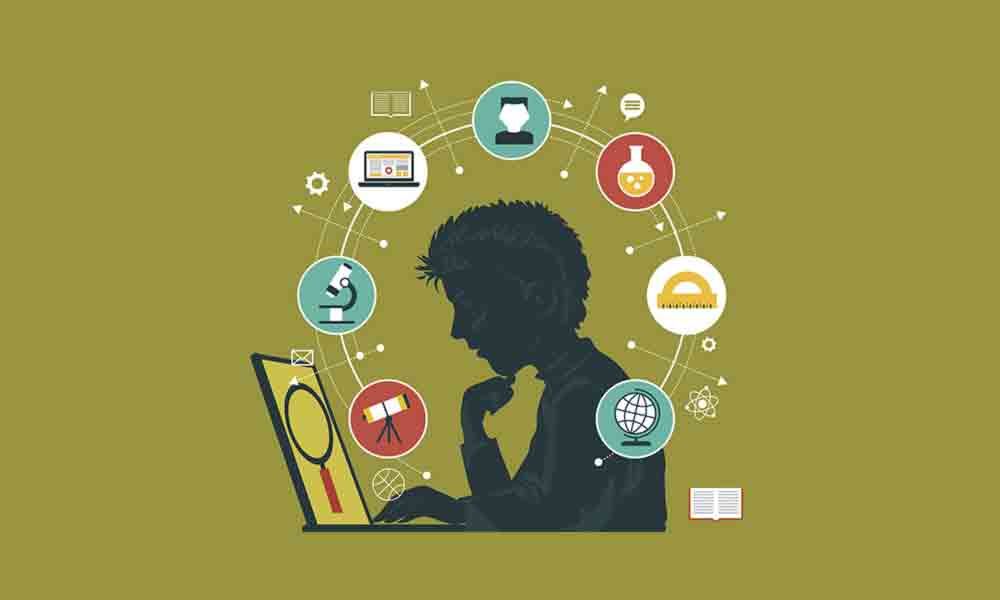Live
- PM Modi to attend Christmas celebrations hosted by Catholic Bishops' Conference of India tomorrow
- ‘Dhop’ from ‘Game Changer’ lights up musical platforms
- Allu Arjun requests fans to stop using abusive language
- Rohit Pathak: A rising star in Indian cinema with powerful villain roles
- Pooja’s ‘final day of shot for 2024’ makes waves
- Nayini Rajender Reddy Addresses Press Conference at Hanumakonda Congress Office
- ‘Game Changer’ pre-release event in Dallas is a blockbuster
- NDMC Vice Chairman hits out at AAP's registration drive; labels it 'election gimmick'
- No place for Stokes as Root returns to England’s squad for India ODIs and Champions Trophy
- Kuwait bestows its highest honour 'The Order of Mubarak Al Kabeer' to PM Modi
Just In
Liberal Arts education, a new wave in learning


Some of Silicon Valley's brightest stars aren't engineers; they are Liberal Arts and Humanities majors
Well, most 12th-grade students and their parents struggle to fit themselves into one of a few narrowly defined boxes, what is it going to be: Engineering, Medicine or Commerce? Little do they realise that the fields have become much vaster and varied too. As parents ask me now what careers their children should pursue and whether it is best to steer them into the science, engineering and technology fields? The best answer that I offer is"it is best to let them make their own choice". They should not, do what our parents did, telling us what to study and causing us to treat education as a chore; instead, they should encourage their children to pursue their passions and to love learning.
The pragmatic attitude taken by most Indian students and parents is certainly understandable in a Country where millions of students regularly compete for scarce college placements and job opportunities. The entrance requirements at Indian Universities have steadily risen, with certain premier colleges in New Delhi posting the mind-boggling admission cutoff, of 99 per cent last year.
In this high-stress setting, students want to study whatever will land them a job, creating a college experience much more akin to "technical training" rather than intellectual exploration.
In a developing Country like India which is riddled by so many teething problems, yet whose educational aspirations are dominated by Engineering and Management, the need for liberal arts is only amplified. Lucky for us, higher education has started taking humanities seriously which previously was a strict no-no and some of the brightest students are choosing it too, giving us dedicated and uncompromising liberal arts Institutes like Ashoka University in New Delhi and FLAME University in Pune.
On the other hand, there are seasoned players like Lady Shri Ram College and St Stephens College in Delhi and Symbiosis School of Liberal Arts in Pune, which have tailored their curriculum and environment to facilitate inter-disciplinary learning.
Tackling today's biggest social and technological challenges requires the ability to think critically about their human context, which is something that humanities graduates happen to be best trained to do.
Some of Silicon Valley's brightest stars aren't engineers; they are Liberal Arts and Humanities majors. LinkedIn's founder, Reid Hoffman, has masters in philosophy; YouTube's CEO, Susan Wojcicki, majored in history and literature; Slack's founder, Stewart Butterfield, in English; Airbnb's founder, Brian Chesky, in the fine arts. Even in China, Alibaba's CEO, Jack Ma, graduated with a B.A. in English, this emphasizes that point that thinking out-of-the-box is more important rather than the stream from which one comes.
A psychologist is more likely to know how to motivate people and to understand what users want than is an engineer who has worked only in the technology trenches. A musician or artist is king in a world in which you can 3D-print anything that you can imagine.
To create the amazing future that technology is enabling, India needs it musicians and artists working hand in hand with its engineers. It isn't exclusively one or the other; it needs both engineering and the humanities.
Do you know where the Liberal Arts got its name from? Ever wondered what it would be like to study one of the oldest subjects in the world? 'Liberal arts' is one such subject - it goes back to the Ancient Greeks who considered a liberal arts education to be the ultimate mark of an educated person.
One of the oldest subjects in the world, liberal arts originated during the most explorative period of 5th century Greece. It was regarded as the hallmark of a good education for all free men, thus the term liberal. Although it may have changed in identity, or rather expanded, it still enables society to probe the boundaries of subjects including, but not limited to, literature, language, history, philosophy, mathematics, psychology and science.
This was the knowledge that every free citizen of the nation would ideally have. And while the ideology of the liberal arts has evolved to include subjects from the world of science, management, arts, humanities and social sciences, the idea remains the same - that education is something that should prepare you to lead a successful life, not merely equip you with half the skills and knowledge required to find your place in some industry and survive.Interdisciplinary education has become a pre-requisite and there is arising a greater need for and focus on how to put your education and skills to use. What if you get to study multiple courses from different fields to get a holistic, inter-disciplinary education in a degree program? A Liberal Arts education makes your wish come true.

© 2024 Hyderabad Media House Limited/The Hans India. All rights reserved. Powered by hocalwire.com






